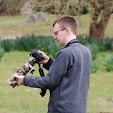Another family camping trip over the Whitsun Bank Holiday weekend saw me, again, surplus to requirements, opening up the possibility of a few days away at a destination of my choice. I have not seen Swallowtail butterflies in some time or photographed them since investing in some decent camera gear, so heading for the Broads and Fens of Norfolk seemed like an attractive option.
 |
| Avocet, Frampton Marsh |
 |
| The reserve holds a healthy breeding population |
 |
| Avocet feeding on the muddy scrapes |
 |
| Not too difficult to photograph in flight due to its highly contrasting plumage making it easier for autofocus to lock on |
Checking the forecast before departure, my first morning away didn't look like great butterfly weather so I started my road trip with an early start at Frampton Marsh, over the border and the from Norfolk in the Lincolnshire section of the Wash. A group of Ruff had been lekking on the reserve viewable from the car park and having only seen this spectacle once before the opportunity to do so again was not to be missed.
 |
| A few Avocet chicks had hatched at Frampton Marsh |
 |
| Avocet |
 |
| Lapwing chicks were also on the reserve |
 |
| The adult Lapwing was nearby |
 |
| A Little Stint was another wader of note on the reserve |
As a Schedule 1 breeding bird, Ruffs can't be photographed at or near the nest without a licence, but as these birds were viewable from a safe distance the RSPB has been encouraging visitors to the reserve to enjoy the spectacle. On arrival I parked near the reserve centre and walked to the old car park near the sea wall from where the lek could be viewed. Avocet chicks had recently hatched in the scrapes by the roadside and the adults were alert to danger, calling loudly and mobbing any passing traffic on the road.
 |
| Two of the three males present in the Ruff lek |
 |
| The female can be seen skulking on the water's edge - looking a bit disinterested here |
 |
| The male Ruff's headgear looks very Elizabethan |
 |
| This male appeared to be bowing to the female |
 |
| The battles between males were brief but fierce |
Much has been written in natural history literature about the sexually charged nature of the Ruff lek but for an unconventional take on it, check out this
Guardian article about 'Ruff Sex'. I would have borrowed 'Let's talk about leks, baby' from this piece as the title for this post but for the intellectual copyright theft it would have represented.
 |
| A distant Glossy Ibis was at Frampton Marsh |
 |
| Several Little Gull were feeding over the water |
 |
| Swift feeding over the neighbouring farmland |
 |
| Tree Sparrows were around the nearby farm buildings |
Spring was certainly in full swing at Frampton, and with so many farmland birds seemingly in trouble and numbers of migrants apparently down, it was a tonic to see Tree Sparrows and good numbers of singing Sedge Warblers alongside the breeding waders. Unfortunately I could not locate the Turtle Doves which were present on my last visit to the reserve but I was reassured that one of their favourite 'purring' trees had blown down in winter storms and that they were still in the wider area.
 |
| Sedge Warbler |
 |
| An energetic singer |
 |
| Sedge Warbler |























I'm typically to blogging and i really recognize your content. The article has really peaks my interest. I am going to bookmark your web site and preserve checking for new information. casino play
ReplyDelete